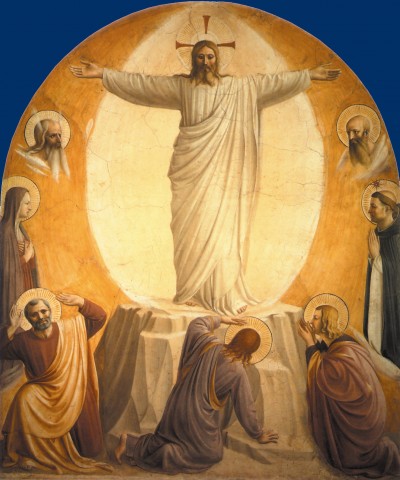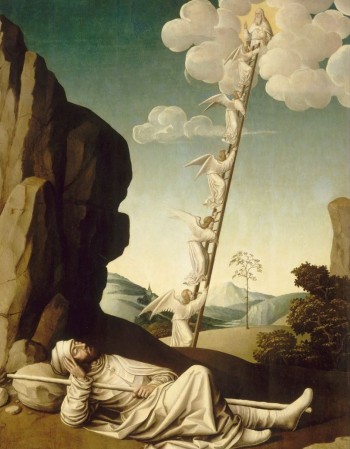Vidi Dominum facie ad faciem

The Stational Church
It is a curious fact of liturgical history that originally the Second Sunday of Lent had no Mass of its own. The Roman clergy and people were tired from the long night vigil that began on the evening of Ember Saturday and ended at dawn with the Holy Sacrifice. Only when the solemn night vigil was pushed back to Saturday morning did it become necessary to put together a separate Mass for Sunday morning.
In Rome, the stational church is Saint Mary in Domnica, originally a Roman deaconry, that is, a dispensary for the poor. For us, this means, that today’s Mass is a kind of pilgrimage in honour of the holy Mother of God, the Virgin of the Poor, who accompanies us throughout the Lenten journey. Our Lady is the dispensatrix of the graces of God: divinarum gratiarum primaria dispensatrix. We enter today’s Holy Mass, then, as poor people enter a dispensary to wash, to find warmth, and to receive food, medicine, clothing, and shelter. It is the Mother of God herself who presides over this dispensary and she, being the humble handmaid of the Lord, places herself at the service of all who come seeking relief, for she «receives all guests who come like Christ Himself» (RSB 53).
Holy Jacob
In the background of today’s Holy Mass stands the holy patriarch Jacob. The lessons and responsories of Matins were all about him and, during Lent, it is Matins that provide the background and preparation for Holy Mass. Jacob is not mentioned by name in the Mass texts, but they reveal to us the prayers and aspirations of his noble soul. In the Introit we said, «Remember, O Lord, Thy bowels of compassion, and Thy mercies that are from the beginning of the world, lest at any time our enemies rule over us» (Psalm 24). And then the great cry by which we began the liturgical year on the First Sunday of Advent returns with an even greater vehemence: Ad te, Domine, levavi animam meam. «To Thee, O Lord, have I lifted up my soul» (Psalm 24).
 I Have Seen the Lord
I Have Seen the Lord
Jacob is a model of trust in God. His life did not get off to a good start. Rebecca, his ambitious mother induced him to disguise himself as his rough older brother and, so, obtain for himself the blessing that Isaac intended for Esau. No matter. There is no human failing, deceit, or strategy that cannot be used by Divine Providence as the starting point of a series of graces. Jacob’s life was marked by setbacks, disappointments, struggles, and sufferings. Through them all, he remained a man abandoned to the mysterious designs of God on his life. In this, Jacob is a figure of the suffering Christ who, from the Cross, makes the act of abandonment that sweeps into the arms of the Father all who follow Him: «Father, into thy hands I commend my spirit» (Luke 23:46). In the end, Jacob appears, like Peter, James, and John on Mount Thabor, all irradiated by the brightness of the Face of God. In the tenth responsory at Matins, he says: Vidi Dominum facie ad faciem: et salva facta est anima mea. «I have seen the Lord face to face: and my soul was kept safe» (Genesis 32:30).
The Collect
The Lenten journey is beset with dangers. It is a via crucis overgrown with thorns and briars, and strewn with jagged stones. As in Psalm 90, vipers and scorpions threaten the imprudent traveler’s feet, and fierce dragons in dark caverns lie waiting for someone to devour. It is no different from the path that lies before a young monk, concerning which our father Saint Benedict says: «Let all the hard and rugged paths by which we walk towards God be set before him» (RSB 58). This is why the Church gives us so comprehensive a Collect today:
O God, who seest that we have no power of ourselves to help ourselves, keep us both outwardly in our bodies, and inwardly in our souls, that we may br delivered from all adversities which may happen to the body, and from all evil thoughts which may assault and hurt the soul.
The Epistle
Saint Paul, in the Epistle, says, «We pray and beseech you in the Lord Jesus, that as you have received from us, how you ought to walk, and to please God, so also you would walk, that you may abound the more» (1 Thessalonians 4:1). The verb ambulare, to walk, occurs twice in the first sentence of the Epistle. There is no standing still in the Christian life, any more than one can stand still in the monastic life. It is a journey: a journey that most of us make, not with great conquering strides, but with little baby steps, putting one foot in front of the other and, more often than not, taking one or two steps backward for every few steps forward.
The great central affirmation of the Epistle, however, gives us confidence and hope: «This is the will of God, your sanctification» (1 Thessalonians 4:3). Knowing that God wills your holiness and mine is immensely comforting. «If God be for us, who is against us?» (Romans 8:31). Herein lies the fulfilment of God’s own words to dear Jacob: «And I will be thy keeper whithersoever thou goest, and will bring thee back into this land: neither will I leave thee, till I shall have accomplished all that I have said. « (Genesis 28:15).
The Gradual
When nothing seems to go smoothly, when one looks to the past and see a long history of miseries and mistakes, when one looks to the future and sees darkness, and danger, and vast deserts, and high mountains, one is tempted to lose heart. The only response to the discouragement that, at certain hours, surrounds one on every side, is to take heart and to pray. The Gradual, again taken from Psalm 24, tells us what to say:
The troubles of my heart are multiplied: deliver me from my necessities. See my abjection and my labour; and forgive me all my sins. (Psalm 24:17–18)
The Holy Gospel
The shining centre of today’s Holy Mass is, of course, the Gospel. And the shining centre of the Gospel is the word of the Father coming from heaven: «This is my beloved Son, in whom I am well pleased: hear ye him» (Matthew 17:5). Blessed Abbot Marmion never tired of praying over this word of the Eternal Father. If, while journeying on, one listens to the messages transmitted by the world, or to what one’s own flesh is saying, or to the lies of the devil, one will surely fall into despair, for hope comes not from the world, nor from the flesh, nor from the devil, but from Jesus Christ, and no other. Our Lord prayed on the night before His Passion: «The words which thou gavest me, I have given to them; and they have received them, and have known in very deed that I came out from thee, and they have believed that thou didst send me» (John 17:8)
The Offertory Antiphon
The soul who listens to Christ will look to Christ. The soul who hears the word of Jesus will raise her gaze to the face of Jesus. «And they lifting up their eyes saw no one but only Jesus» (Matthew 17:8). In the light of this word, the Offertory Antiphon becomes an impassioned confession of love for Christ, the fulfilment of the law and the prophets (Matthew 5:17). No longer do we sing our love of the commandments of the old Torah; our love goes directly to Christ, «the way, and the truth, and the life» (John 14:6) whose holy and adorable face fills our eyes with light. We sing, then, to the Father, replacing the psalmist’s word, «commandments», with the Father’s own utterance, «beloved Son»:
I will meditate on thy Beloved Son, whom I have loved exceedingly: and I will lift up my hands to thy Beloved Son, whom I have loved. (See Psalm 118:47–48)
The Communion Antiphon
This same Beloved Son gives Himself to us in Holy Communion, and the Church, our most provident mother, supplies us, in the Communion Antiphon, with words for the very moment of our union with the Beloved Son of the Father:
Understand my cry, hearken to the voice of my prayer, O my King and my God, for to thee will I pray: O Lord, O Beloved Son of the Father. (Psalm 5:2–4).
The Communion Antiphon is taken from Psalm 5, one of the classic «morning psalms» chosen by our father Saint Benedict for the Office of Lauds. Why a morning psalm here at the Communion of the Mass? So often as we hear the word of the Beloved Son, and receive the adorable mysteries of His Body and Blood, a new day dawns. It is morning again, the morning of the soul, concerning which the prophet Jeremias says:
The mercies of the Lord that we are not consumed: because his commiserations have not failed. They are new every morning, great is thy faithfulness. The Lord is my portion, said my soul: therefore will I wait for him. The Lord is good to them that hope in him, to the soul that seeketh him. (Lamentations 3:22–25)
The Postcommunion will sum up the grace of this Holy Mass:
Strengthened with Thy sacraments, may we henceforth serve Thee by a worthy manner of life.
Unto Sanctification in Christ Jesus
What is this «worthy manner of life» if not the way of the patriarch Jacob who said, «Indeed the Lord is in this place, and I knew it not» (Genesis 28:16)? What is it if not the way described by Saint Paul who, in the Epistle, assured us: « «This is the will of God, your sanctification» (1 Thessalonians 4:3)? What is it if not the way so lovingly shown by the Father Himself: «This is my beloved Son, in whom I am well pleased: hear ye him» (Matthew 17:5)? What is it if not the brightness of the Face of the transfigured Christ tabernacled in the hearts of the Apostles as they came down from the mountain? None of what was given to Jacob, to Paul, to Peter, James and John is denied us. All that was given them is given us abundantly and without delay, by the hands of Our Lady, dispensatrix omnium gratiarium, and by the hands of the Church, «that no one may be troubled nor grieved in the house of God» (RSB 31), and this «unto sanctification in Christ Jesus our Lord» (1 Thessalonians 4:7).
